
Equatorial Guinea, officially the Republic of Equatorial Guinea, is a country on the west coast of Central Africa, with an area of 28,000 square kilometres (11,000 sq mi). Formerly the colony of Spanish Guinea, its post-independence name evokes its location near both the Equator and the Gulf of Guinea. As of 2015, the country had a population of 1,225,367.

Guinea, officially the Republic of Guinea, is a coastal country in West Africa. Formerly known as French Guinea, the modern country is sometimes referred to as Guinea-Conakry, after its capital and largest city Conakry, to distinguish it from other countries with "Guinea" in the name and the eponymous region, such as Papua New Guinea,Western New Guinea, Guinea-Bissau and Equatorial Guinea. Guinea has a population of 12.4 million and an area of 245,857 square kilometres (94,926 sq mi).

Guinea-Bissau, officially the Republic of Guinea-Bissau, is a country in West Africa that covers 36,125 square kilometres (13,948 sq mi) with an estimated population of 1,874,303. It borders Senegal to the north and Guinea to the south-east. Guinea-Bissau was once part of the kingdom of Kaabu, as well as part of the Mali Empire. Parts of this kingdom persisted until the 18th century, while a few others were under some rule by the Portuguese Empire since the 16th century. In the 19th century, it was colonised as Portuguese Guinea. Upon independence, declared in 1973 and recognised in 1974, the name of its capital, Bissau, was added to the country's name to prevent confusion with Guinea. Guinea-Bissau has a history of political instability since independence, and only one elected president has successfully served a full five-year term. The current president is Umaro Sissoco Embaló, who was elected on 29 December 2019.
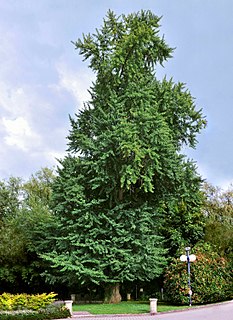
Ginkgo biloba, commonly known as ginkgo or gingko, also known as the maidenhair tree, is a species of tree native to China. It is the only living species in the order Ginkgoales, which first appeared over 290 million years ago. Fossils very similar to the living species, belonging to the genus Ginkgo, extend back to the Middle Jurassic approximately 170 million years ago. The tree is widely cultivated, and was cultivated early in human history.

Ginkgoales is a gymnosperm order containing only one extant species: Ginkgo biloba, the ginkgo tree. It is monotypic, within the class Ginkgoopsida, which itself is monotypic within the division Ginkgophyta. The order includes five families, of which only Ginkgoaceae remains extant.
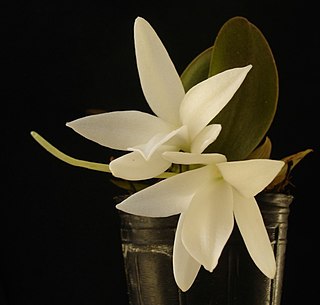
Aerangis, abbreviated as Aergs in horticultural trade, is a genus of the Orchid family (Orchidaceae). The name of this genus has been derived from the Greek words 'aer' (air) and 'angos' (urn), referring to the form of the lip. It is the type genus of the subtribe Aerangidinae, which has recently been subsumed in the subtribe Angraecinae. Approximately 50 species in this genus are known mostly from tropical Africa, but also from the Comoro Islands, Madagascar and Sri Lanka.

Bilobalide is a biologically active terpenic trilactone present in Ginkgo biloba.

Gasteracantha is a genus of orb-weaver spiders first named by Carl Jakob Sundevall in 1833. The females of most species are brightly colored with six prominent spines on their broad, hardened, shell-like abdomens. The name Gasteracantha is derived from the Greek gaster (γαστήρ), meaning "belly, abdomen", and akantha (άκανθα), meaning "thorn, spine". Spiny-backed orb-weavers are sometimes colloquially called "crab spiders" because of their shape, but they are not closely related to the true crab spiders. Other colloquial names for certain species include thorn spider, star spider, kite spider, or jewel spider.
This is an index of articles related to Africa, by country:
- Index of Algeria-related articles
- Index of Angola-related articles
- Index of Benin-related articles
- Index of Botswana-related articles
- Index of Burkina Faso-related articles
- Index of Burundi-related articles
- Index of Cameroon-related articles
- Index of Cape Verde–related articles
- Index of Central African Republic-related articles
- Index of Chad-related articles
- Index of Comoros-related articles
- Index of Democratic Republic of the Congo-related articles
- Index of Republic of the Congo–related articles
- Index of Djibouti-related articles
- Index of Egypt-related articles
- Index of Equatorial Guinea–related articles
- Index of Eritrea-related articles
- Index of Ethiopia-related articles
- Index of Gabon-related articles
- Index of Gambia-related articles
- Index of Ghana-related articles
- Index of Guinea-related articles
- Index of Guinea-Bissau-related articles
- Index of Ivory Coast-related articles
- Index of Kenya-related articles
- Index of Lesotho-related articles
- Index of Liberia-related articles
- Index of Libya-related articles
- Index of Madagascar-related articles
- Index of Malawi-related articles
- Index of Mali-related articles
- Index of Mauritania-related articles
- Index of Mauritius-related articles
- Index of Mayotte-related articles
- Index of Morocco-related articles
- Index of Mozambique-related articles
- Index of Namibia-related articles
- Index of Niger-related articles
- Index of Nigeria-related articles
- Index of Réunion-related articles
- Index of Rwanda-related articles
- Index of Saint Helena-related articles
- Index of São Tomé and Príncipe-related articles
- Index of Senegal-related articles
- Index of Seychelles-related articles
- Index of Sierra Leone–related articles
- Index of Somalia-related articles
- Index of South Africa-related articles
- Index of Sudan-related articles
- Index of Swaziland-related articles
- Index of Tanzania-related articles
- Index of Togo-related articles
- Index of Tunisia-related articles
- Index of Uganda-related articles
- Index of Western Sahara-related articles
- Index of Zambia-related articles
- Index of Zimbabwe-related articles
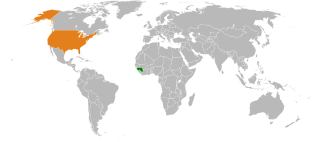
Guinea – United States relations are bilateral relations between Guinea and the United States.

The following outline is provided as an overview of and topical guide to Guinea-Bissau:

The following outline is provided as an overview of and topical guide to Guinea:
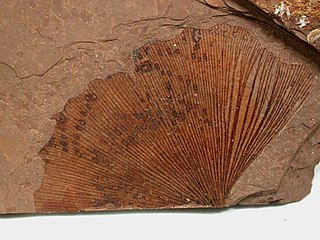
Ginkgo is a genus of highly unusual non-flowering seed plants. The scientific name is also used as the English name. The order to which it belongs, Ginkgoales, first appeared in the Permian, 270 million years ago, and is now the only living genus within the order. The rate of evolution within the genus has been slow, and almost all its species had become extinct by the end of the Pliocene; the exception is the sole living species, Ginkgo biloba, which is only found in the wild in China, but is cultivated across the world. The relationships between ginkgos and other groups of plants are not fully resolved.

Aerangis fastuosa, commonly known as the 'Magnificent Aerangis', is a species of epiphytic orchid endemic to Madagascar. It is widespread across Madagascar, stretching from the eastern coastal forests across to the south and along the central plateau. Aerangis fastuosa belongs to the family Orchidaceae, substribe Aerangidinae.

Aerangis luteoalba is a species of epiphytic orchid native to eastern and central Africa. This species includes 2 currently recognized varieties:
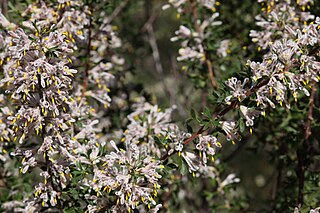
Petrophile biloba, commonly known as granite petrophile, is a species of flowering plant in the family Proteaceae and is endemic to southwestern Western Australia. It is a shrub with pinnately-divided leaves with sharply-pointed tips, and oval heads of hairy, mostly grey to pink flowers.

Aerangidinae is classified as a subtribe within the tribe Vandeae in the family Orchidaceae. However, it is likely to soon become a synonym of Angraecinae with the genera below re-allocated to this sub-tribe. As traditionally circumscribed, it consists of 36 genera and about 300 species. The type genus of this subtribe is Aerangis. Members of this group are epiphytic orchids having a monopodial habit and are endemic to tropical Africa and Madagascar. They are distinguished from the other subtribes in Vandeae by having an elongate rostellum, an elongate spur, and two pollinia. Most genera in the group indicate pollination by moths, however leaf beetles are reported as frequent visitors, but it is unknown whether they are vectors for pollination.

Ginkgotoxin (4'-O-methylpyridoxine) is a neurotoxin naturally occurring in Ginkgo biloba. It is an antivitamin structurally related to vitamin B6 (pyridoxine). It has the capacity to induce epileptic seizures.

Bartheletia paradoxa is a species of dimorphic fungus and is the only member of the genus Bartheletia. Bartheletia is the only genus in the family Bartheletiaceae, which is the only family in Bartheletiales, which in turn is the only order in the class Bartheletiomycetes.














